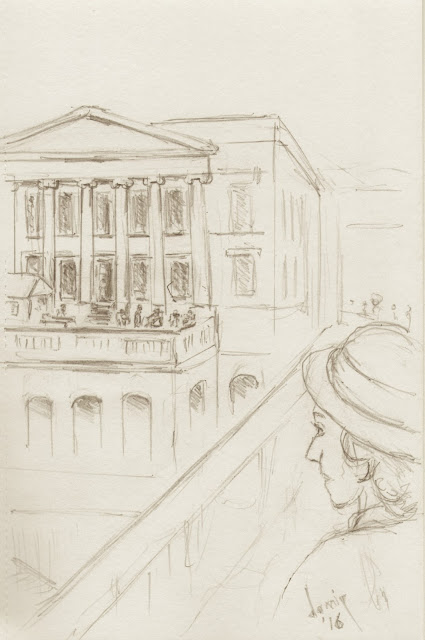Impression sketch for
a girl's patriotic gesture.
Established in the heart of the
English capital,
The Fishmongers Hall had
witnessed many
Varied eras over 600 years, from
medieval
Beginnings as a city guild; once destroyed
In the great fire of London was
then rebuilt.
With such a history the
Fishmongers Hall
Again adapted in 1914 in a time
of war -
Alderman wives in approaching
many
Firms made request to Fishmongers
Hall.
Then owned by a city livery
company.
In need to treat wounded men, the
hall agreed
To become Royal Red Cross
Hospital; while
Small and grand facing the River
Thames, the
Situation served well for
recovering officers
With 27 beds; opened on 1 October
1914.
Along with the apartments used on
the first
Floor, the Great Hall was divided
into five
Cubicles next to the windows. Positioned
Amid the gilded decoration, was another
Room divided into two, to hold
four beds.
A wooden hut was constructed out
on
The balcony - for those cases of
septic
Nature or needing open air - on
the quiet
Side were other rooms for more
serious
Wounded, with X-ray and operating
rooms.
A 27-bedded hospital gave
environment akin
To homeliness with armchairs,
electric lights
And reading tables - pink rugs
next to beds
With down quilts - meals served
in rooms
Allowing two guest visitors for
afternoon tea.
Situated alongside London Bridge,
endless
Traffic passed by. This included one
young
Lady, who decided to write to the
grand
Hospital offering her services -
prompted
By her daily excursions across
the bridge.
Though her actual name was
finally omitted
From the published transcript,
Jane as she
Might be called for purposes
here, would
Have seen wounded men taking the
air
On the balcony - being moved to
assist.
The House Surgeon of Fishmongers
Hall
Hospital, had received the letter
from Jane,
A city worker, who began by
apologetically
Saying she was taking liberty in
her question,
To ask after the process of
healing wounds.
Jane had heard that there had
been a lack
Of skin - which if grafted to the
wounded
Man, would to be better and
easily healed.
For this purposes Jane made offer
of her
Own skin, as much as practically
possible.
Jane informed the house surgeon
of her
Situation - being obliged to
travel every
Day into the city to earn a
living - this
Was not an impulsive idea - no doubt
Having seen arrivals of
ambulances.
Jane’s own situation disallowed
any
Chance to help soldiers as other
girls
Her age had done - how she might help
Then by offering her own skin -
she wanted
To do this for her two fighting
brothers sakes.
Having taken much time to think of
this
Contribution, Jane stated how she
knew
Of nowhere else to write -
furthermore that
If they could not use her
services for taking
Skin grafts, where else might she
approach?
by Jamie Mann.
Anon.,1916. A
Girl's Patriotism - Offer to Hospital. The Daily Telegraph, [online] 10 October 1916. P.5. Col.3.
Available at: <http://www.telegraph.co.uk/news/ww1-archive/12213439/Daily-Telegraph-October-18-1916.html>
[Accessed: 20 October 2016].
Mann, J., 2016. 100 years Ago - Poems by Jamie Mann. [letter] (Personal
communication, 20 October 2016).
#WW1 #WW1centenary #GreatWar #WW1poem #GreatWar #WW1centenary
#worldwarone #worldwaroneremembered #WW1London

No comments:
Post a Comment